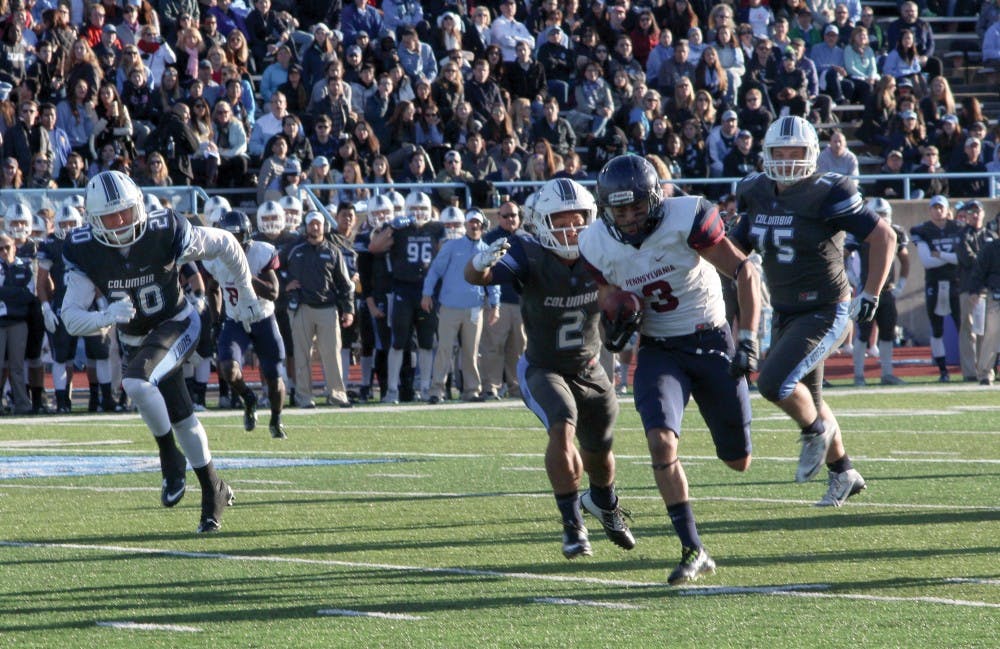Benjamin Franklin’s noble cause lives on in a group of Quakers who work to ensure that there is no perspiration without representation.
Composed of 59-student athletes representing each of the school’s 31 varsity teams, the Student-Athlete Advisory Committee is dedicated to ensuring that student-athletes have a voice within the athletic department.
Each coach is asked to nominate one or two of their players to serve as the team’s SAAC representative. Once selected, the athletes serve as liaisons between their teammates and administrators.
“We meet twice a month, which is our main time for the student athletes to bring [forward] issues, concerns, likes, dislikes,” said Rachel Hiller, director of compliance for Penn Athletics and an overseer of the SAAC program. “There’s also time for me to give our student athletes NCAA legislative updates or athletic department updates, things like that.”
Between meetings, the representatives and administrators are in constant contact through email.
“The main goal is to serve as a vehicle promoting communication between the administration and our student athletes,” Hiller said. “What’s great about SAAC is that because every sport is represented, it’s an open forum, everyone has a voice, everyone has an opportunity to lead and to have an active role in it.
“We also do a lot of community service. This year we’ve been doing a great job so far on focusing how we can serve the greater Philadelphia area.”
One initiative of SAAC is to develop supportive relationships between athletes across all sports.
“We’re trying to [encourage] bonding amongst all our teams, and a great program we have right now is called the Quaker Cup,” Hiller said. “It’s basically an incentive program to get all of our teams more active. Whether it be by attending what we call Quaker Days, for which every team can fill out a game or competition where they want the entire athletic department to come, or through a community service event, or [through our] academic component.”
The athletic community is a tightly knit one, but the time-intensive nature of Division I athletics can cause athletes to feel isolated, with little time to find social niches away from their teammates and fellow athletes. Fostering the bond between student-athletes and their not-so-athletic fellow students is a main priority for the SAAC.
“One of our big goals is to reach out to the Penn community on a larger scale, and get their involvement,” Hiller said.
But it is the student-athletes, not the administrators, who must turn these plans and goals into actions and accomplishments.
“It really is a student-athlete organization. I just help tie that communication together,” Hiller said.
“We dive into the issues that are brought up. We have a high focus on connecting the rest of campus with the athletic community,” said football senior and SAAC student president Cameron Countryman.
“I think it’s really important for the rest of the community at Penn to realize what we do as athletes,” Countryman said of his efforts to get more Penn students cheering the hard-working athletes on from the stands.
“It’s really not a job for everyone. We have full schedules and on top of that there are practices and games, we’re traveling ... I respect every single athlete on campus, because I know how tough it is. And as a board member I feel like it’s my job to bring together that athletic community with the student body.”
What are some ways to make progress on this front? Countryman offers an example of a potential initiative:
“Getting fraternities and sororities more involved with supporting our teams, and then supporting each other between their philanthropy events and our fundraisers. That’s one thing we’re looking to do.”
Hiller admires the energy put in by Countryman and the other 58 student-athlete representatives.
“It’s time-demanding. It’s asking student-athletes who already have a super busy schedule to give even more. But [because of this], you’ll get the students that want to be leaders, and want to have a voice.”









